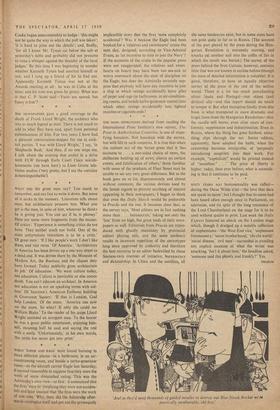THE MAIN IMPRESSION derived from reading the International Press Institute's
new survey, The Press in Authoritarian Countries, is one of stupe- fying boredom. Not boredom with the survey, but with life in such countries. It is true that when the authors say of the Soviet press that it 'has recourse to . . . a one-sided choice of news, the deliberate holding up of news, silence on certain events, and falsification of others,' those familiar with some of the products of Fleet Street may be unable to see any very great difference. But as the book goes on to list, dispassionately and almost without comment, the various devices used by the Soviet regime to prevent anything of interest appearing in their newspapers, I began to think that even the Daily Sketch would be preferable to Pravda and the rest. It becomes clear that, as the survey says, 'Most editors are in fact nothing more than . . . bureaucrats,' taking not only the `line' from on high, but great wads of their news- papers as well. Editorials from Pravda are repro- duced with ghastly monotony by provincial editors playing safe, and the same tendency results in incessant repetition of the stereotypes long since approved by authority and therefore the best recourse to an editor bedevilled by those Siamese-twin enemies of initiative, bureaucracy and dictatorship. In China and the satellites, all the same tendencies exist, but in some cases have not gone quite so far as in Russia. (The account of the part played by the press during the Hun- garian Revolution is extremely moving, and knocks yet another nail into the coffin of lies in which the revolt was buried.) The survey of the press behind the Iron Curtain, however, contains little that was not known in outline before (though the mass of detailed information is valuable). It is good, therefore, to have an equally objective survey of the press in the rest of the unfree• world. There is a lot too much pussyfooting about Spain and Portugal—our oldest (and dirtiest) ally—and this report should do much to temper it. But what transpires finally from this book is what transpired in more dramatic and tragic form from the Hungarian Revolution—that the candle still burns, even after years of con- formity,•suppression and indoctrination. Even in Russia, where the thing has gone farthest, some- thing slips through the net. Soviet editors, apparently, have adopted the habit, when the censorship becomes intolerable, of 'purposely introducing misprints into their work. For example, "capitalism" would be printed instead of "socialism." . . .' The price of liberty is higher, today, than ever before; what is astonish- ing is that it continues to be paid.


































 Previous page
Previous page